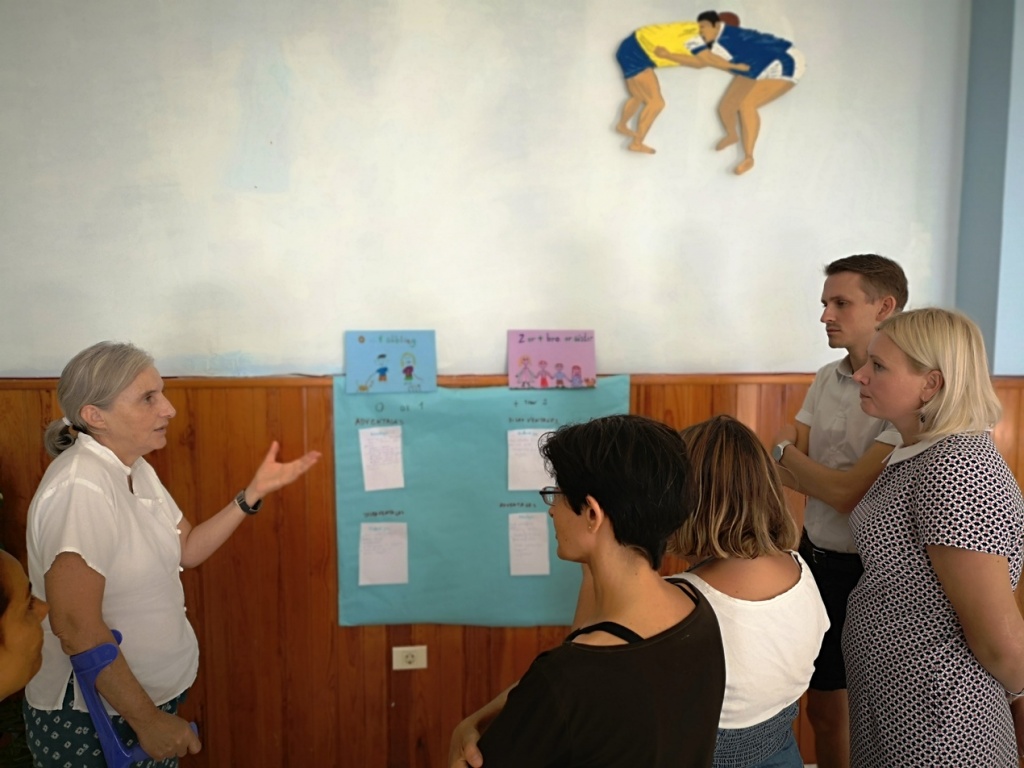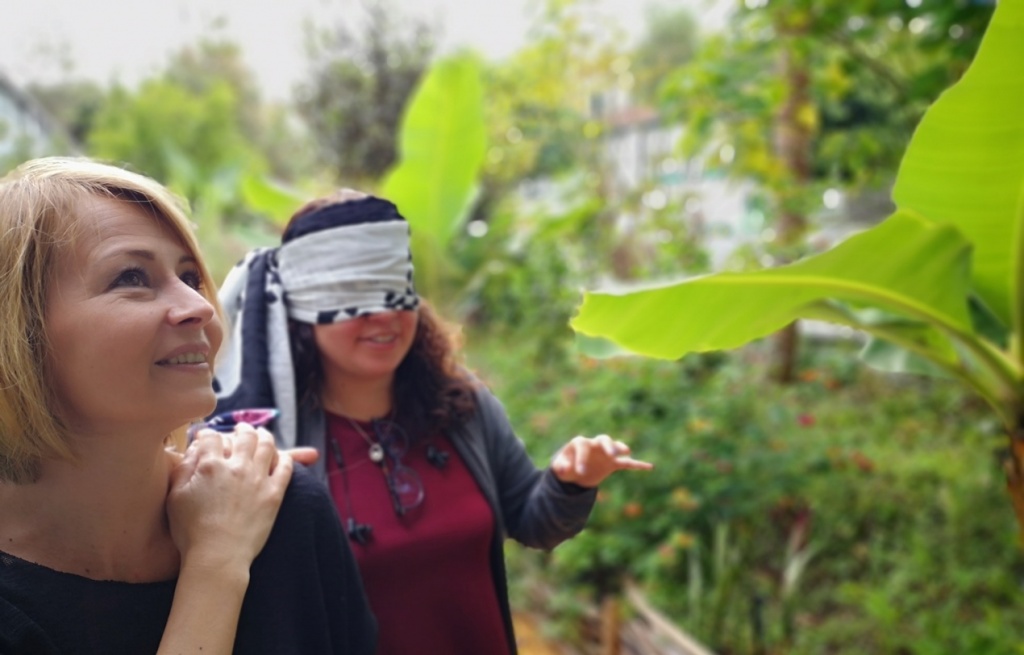Nowadays, teachers and adult education trainers need to face with very diverse profiles of students from vulnerable backgrounds, marginalized groups in risk of exclusion. Teachers and adult education trainers need to develop their personal and social skills in order to understand the very different realities of their learners. Empathy, active listening and other special skills are necessary when working with learners with physical or mental special needs, learners with difficult socio-economic situations, women dealing with domestic violence, persons with literacy challenges, seniors, learners from different cultural backgrounds such as refugees, migrants etc.

This training course is for teachers who want to learn about different alternative methodologies that can be used to adapt teaching to the needs of learners from vulnerable backgrounds. Teachers will learn how to apply various active learning methods in order to promote inclusion, tolerance and diversity. They will experience examples of activities that can be designed to support increasing diversity in nowadays society. The active learning methodologies are adequate for social inclusion of marginalized learners because they focus on learning-by-doing and interactive exercises in small groups.
Through role plays, trust games and other theater techniques and exercises, the participants will learn how to build empathy, improve their active listening, break the barriers and stereotypes. They will experience live testimonials from different disadvantaged learners and will have the possibility to train and put in practice their skills of empathy and respect for learners, irrespective of their cultural, ethnic, socio-economic background or educational level. This way, the participants will learn how to generate a humanistic and anti-discriminating learning atmosphere and teach their students how to be open to the differences, different backgrounds, different cultures etc.
The nature of this course is highly practical and hands on, so the participants will experience themselves the creative techniques while also reflecting on how to apply them to their context.
Objectives
- Increase knowledge about the realities of the different types of disadvantaged learners.
- Reflect on the different situations that lead to marginalization, social exclusion and poverty.
- Build empathy, trust and improve active listening skills
- Learn how to break the barriers and stereotypes regarding learners from disadvantaged backgrounds
- Learn how to identify and reflect on the needs of vulnerable learners.
- Understand how to apply active learning methodologies with disadvantaged learners.
- Learn how to design activities to support increasing diversity in nowadays society
- Get inspired on how to generate a humanistic, anti-discriminating and stimulating learning atmosphere
- Exchange best practices on how to handle difficult situations with learners from vulnerable backgrounds.
Target audience
Adult education trainers, teachers (pre-school, primary, secondary, vocational, adult education centers), teachers trainers, school leaders and other school staff and professional workers that work with learners from disadvantaged backgrounds.
For groups of 8 teachers or more, we adapt the course content and approach to the specific needs of your educational center and offer personalized funding assistance.
Daily programme
Day 1 – Monday
- Welcome to the course
- Ice breaking: Getting to know each other
- Understanding the diversity in nowadays society and the realities of disadvantaged learners
- Mapping situations that lead to marginalization, social exclusion and poverty
- Group dynamics: Building trust in the group
- Exchanging good practices on how to handle difficult situations with learners from vulnerable backgrounds.
Day 2 – Tuesday
- Warm up and teambuilding exercises
- Roleplays, exercises and theater techniques to improve necessary skills for working with disadvantaged learners
- Active listening skills and a delicate respectful approach
- Non-verbal and paraverbal communication
- Exercise in pairs: The importance of eye-contact
- Group dynamics: Reinforcing trust and respect
- Reflection exercises: How can I apply active learning in my class?
Day 3 – Wednesday
- Energizers and teambuilding exercises
- Introduction to Kolb’s Experiential learning cycles
- Experiential learning for a reflective and respectful learning environment
- Building empathy through experiential learning
- Visit to a relevant institution specialized working with learners from a disadvantaged backgrounds (for example, learners with physical special needs, behavioural disorders, illiteracy etc.)
- Reflection exercises: How can I apply experiential learning in my class?
Day 4 – Thursday
- Effective relaxation techniques and movement-based activities to be used with special needs students
- Video or live testimonials from a learner from a disadvantaged socio-economic and/or cultural background
- Exercises to practice empathy, respect and breaking barriers
- Group reflection: How can I adapt testimonials (video or live) in my teaching?
Day 5 – Friday
- Visit to an Association with ecologic garden, that has worked for 23 years on how to use permaculture thinking to adapt to work with learners with mental disabilities.
- Open discussion on possible future collaborations and planning follow up activities
- Summary of key learning points
- Final course evaluation and feedback
- Validation of learning outcomes and handling certificates
Methodology

We tailor our working methods based upon the participants‘ needs and professional profiles in order to ensure easier adaptability and application of the tools to the real life.
Our standard methodology is based on active learning and it is highly participative and practical. We have a hands on approach that comprises group exercises, role plays, experiments, case studies and simulation exercises. We use collaborative learning techniques to foster the exchange of good practices and collective learning.
The pedagogical methods used in this training course are based on experiential learning and learning by doing, art-based methodologies and testimonials and case-studoes. Our focus is on showing the participants how the learners’ motivation increases when they become the actors of their own learning because the teacher takes the role of facilitator or learning guide. Thus, the participants get the chance to experience on themselves the benefits of the active learning methodology at the same time as learning how to apply it in their classroom.
Energizers, games and group dynamics are foreseen daily in order to ensure a positive energy and a cooperative learning climate in the group.
Group reflections and daily brief feedback sessions are planned to help adapting the learning programme to the specific needs of the participants.
Certification and validation of learning outcomes
- Certificates of attendance
- Support with the Europass mobility certificates – to be issued by the applicant’s National Agency
Upon request, we also provide educational centers with additional documents that are required to certify the presence to the course and the competences learned. For example, we provide photos of the training course that can be used for dissemination purposes.
Pre-register to our course!
Write us some details about your project idea. How many participants do you want to send? What are the profiles of the teachers/staff interested in the course?
